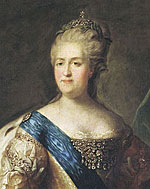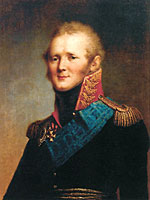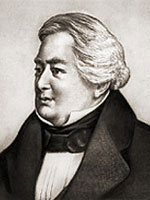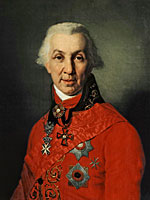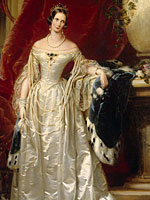'Dedicated to the Emperor of Russia…'
Musical gifts were presented to various members of the House of Romanov: emperors, empresses, grand dukes and duchesses. The earliest of them, stored in the collection of the National Library, were dedicated to Catherine the Great. In 1780, the Empress were presented with the manuscript comprising two works bound together. The author of the first item - the «Ode» for the voice and piano - was Philipp Jakob von Thonus, Lieutenant from Saxony. The other work, written after the «Ode» is the Collection of Spiritual Chants by Carl Philipp Emanuel Bach.No background data about von Thonus have been found so far. There is no information about the relations of C.P.E. Bach with the Russian Imperial court, either. Obviously, the author of the «Ode» realized that his name would not make an impression on the empress. To draw her attention to his composition, he attached it to the work of the well-known contemporary who gained well-deserved recognition not only in Germany but also in other European countries.
Another manuscript with an inscription to Empress Catherine the Great, was presented on behalf of the Italian organist and composer Antonio Lolli, an author of the operas, oratorios, cantatas, masses and so on. It is the «Grand Concert» for violin and chamber orchestra, composed in 1777. The manuscript contains an extensive address to the Empress, in which the highly celebrated musician calls Catherine a "true connoisseur" of arts which she 'patronizes and rewards with her inherent beneficent prudence, expert taste and generosity'.
Wilhelm Ferdinand Rong, the German composer and musician at the court of Prince Henry of Prussia, also dedicated his composition «Salve, Regina» to Catherine II. He decorated the manuscript presented to the Empress with a printed reproduction of the image of the Our Lady of Kazan, carrying the inscription in Russian. Probably, in Prussia there was known a deed of the Empress, associated with this icon. In 1767, during his journey along the Volga, Catherine II visited the Kazan Virgin Monastery to listened to Liturgy, and then put her diamond crown on the frame of the Virgin icon.
Among the materials of the collection of gifts are also musical tributes to Emperor Alexander I. One of them is the «Choir for the Coronation of His Majesty» written by Osip Kozlovsky (Joseph Kozlowsky) on the poem by Gavrila Derzhavin. Kozlovsky was inspired by verses of the chief Russian poet before Pushkin not for first time. In 1791, he created the polonaise Let the thunder of victory sound! which became the unofficial anthem of Russia in the late 18th-early 19th century.
Since O. Kozlovsky was born in Warsaw (in 1757) and was a music teacher Michael Cleophas Oginski, the Polishs have good reason for considering him to be a national composer, although most of his life he lived in Russia. Between 1786 and 1796, Kozlovsky was an officer in the Russian army in the retinue of the prime minister Prince Potemkin who introduced him to the Court. Since 1799, Kozlovsky supervised the orchestras of the Imperial Theatres.
Being closely connected with to the Court, Kozlovsky dedicated many of his works to the Russian emperors, especially to Alexander I favoring him. In addition to the «Choir for the Coronation of His Majesty», the collection of the musical gifts includes the hymn «Te Deum laudamus ("Thee, O God, we praise")». This manuscript also contains an address to Alexander I; the Emperor monogram "A I" is placed on the cover. The style of the binding is rather simple but elegant: the green leather with the monogram embossed in gold. The binding has a special inner pocket for notebook with individual parts. Undoubtedly, the binding was made by special order.
The «Te Deum laudamus» by Kozlovsky marks the end of the Napoleonic wars, Napoleon's defeat and abdication of the throne. In November of 1815, the Peace Treaty between France and the allied powers was signed in Paris. The event was regarded as the world peace and was reflected in the arts. For example, one of the pieces of cut glass ware of that period, kept in the State Museum Kuskovo, carries an engraved inscription: 'World Peace of the 8th November of 1815'. The term 'the world peace' also appears in the dedication to Emperor Alexander I on the title page of the hymn.
Such a significant event for the people of Europe was mentioned in other works of the musical collection. The author of one of them, arranged for chorus and orchestra and entitled the «Winning Song», is the German composer Franz Huss.
Another German musician - the pianist and composer Karl Traugott Zeuner presented to Alexander I the composition «Air Russe» ("Russian Song"). Zeuner twice visited St. Petersburg. During one of these visits, he gave a concert which, apparently , was attended by the Emperor. This is evidenced by a note on the front page «Air Russe», 'Having a great opportunity to be heard by your Imperial Majesty, I have decided to show you my respect by these new musical work. This Russian theme, very dynamic, which has not been developed yet by any author, and I tried to modify in the new style for piano, violin and cello. If the quality of a work of art depends not so much on the inspiration of genius, but on the good intentions, I could rely on the approval of your Imperial Majesty'.
The National Library posesses music manuscripts presented to other emperors, including Nicholas I, Alexander II, Alexander III and Nicholas II. Especially many musiacal tributes was given to Alexander II. Musical gifts to him number almost half of the whole collection.
There is also a musical tributes to empresses. For instance, Alexandra Feodorovna, the wife of Emperor Nicholas I was presented with the «Cavalry March» from Christian Heinrich Pauffler, the march «Welcome to San Souci» from Job Wilhelm David von Witzleben and with the vocal composition entitled «Virtue» from Louis Stubbe.Josef von Yakobchich dedicated his waltz to Alexander II's wife Maria Alexandrovna, and Maria Loginova presented to the Empress Variations on a theme of the romance «Why are you silent». And finally, the Empress Maria Feodorovna (the wife of Emperor Alexander III) received the french polka by Carl Sonntag as gift.
The history of the creation of «Welcome to San Souci» by von Witzleben deserves to be specially mentioned. It was connected with events of 1829, when the Russian Imperial couple were visiting Berlin for a wedding of the second brother Alexandra Feodorovna - Prince William with Princess Augusta of Saxe-Weimar-Eisenach, a niece of Nicholas I. To celebrate Alexandra's birthday, her brothers held the festival «Magic of the White Rose» in the palace of Sanssouci in Potsdam near Berlin. The main event of the celebration was knights jousting in medieval costumes. That is why, the author must have chosen the genre of cavalry march for his work.
The gift of Mary Loginova to Empress Maria Alexandrovna is also worth special notice. In the dedication to the Empress, she introduced herself as the wife of a collegiate assessor from the town of Slobodskoy in Vyatka province. This feature gives no idea of who was actually Maria Loginova (nee Palchikova ). Meanwhile, her name is associated with the biography of Tchaikovsky. She taught children music, and one of her pupils was the future great composer. Maria Loginov gave him the first piano lessons, taught him to read and write music, fostered love for folk art. The Variations for the piano, presented to the Empress by Maria Loginova, were preceded by the following lines, 'A distinctive feature of the royal persons of the Russian State is the patronage of both science and the arts. A branch of the latter has been my constant occupation from a child (sic!)'.
Sometimes, musical gifts were accompanied by requests to members of the House of Romanovs. So, Anton Preuss who gave music lessons to children of Grand Duchess Maria Pavlovna and dedicated the «Big Russian Military March» for piano four hands to her, asked her about the award of the Order of Merit to the Russian Empire.
